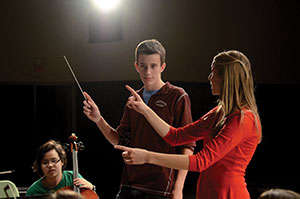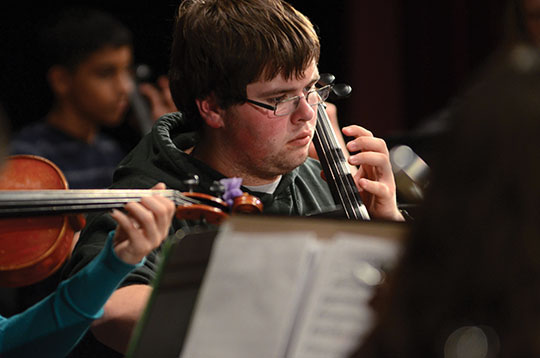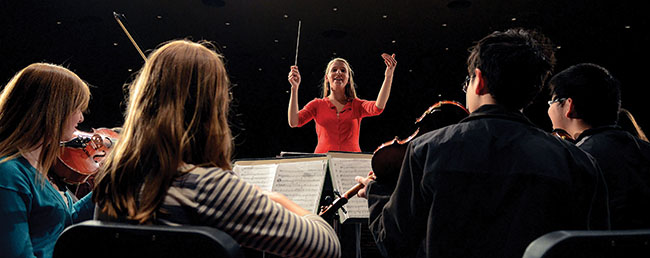Music education student shines as leader of growing youth ensemble
“Ready? One, two, ready, go.”
The conductor’s baton drops and swirls into the beat, while a stageful of teen musicians practice a Trans-Siberian Orchestra piece for an upcoming concert.
The auditorium is empty and there is laughter between each song. But their leader is preparing them for something bigger than their next performance.
A talented violinist, Lyndra Tingley spent her childhood becoming serious about beautiful music. Now she is serious about teaching.
And beautiful music.
She was hired as director of the Mason Philharmonic Orchestra when she was just a sophomore in the music education program at Michigan State University. Two years later, the extracurricular group has tripled in size from 20 to more than 60 kids—and growing.
As members joined from other nearby communities, Tingley arranged to move rehearsals from the group’s base in Mason to Okemos, where the central location and school-based strings program have helped the group flourish. She has planned concerts, summer camps and a visit to Michigan’s well-known Interlochen Center for the Arts, from which she graduated in 2008.
Playing in an orchestra can be a rare opportunity for youth as schools struggle to keep or expand arts programs, especially those including string instruments. In the Mason Philharmonic, Tingley has created a community where fun and confidence seem to flow along with music from the strings, woodwinds and brass sections.
“She really motivates the kids and keeps them interested,” said Kay Lancour, whose son and daughter are members of the orchestra. With Tingley’s encouragement, they both have received opportunities to play solos and even, in Joey Lancour’s case, a chance to conduct a piece at the winter show.
 “I just see a lot of growth in my kids,” Kay said. “I don’t know how she does it all.”
“I just see a lot of growth in my kids,” Kay said. “I don’t know how she does it all.”
This fall, Tingley completed her teaching internship, a one-semester requirement for MSU music education students, at St. Johns Public Schools. Meanwhile, she also continued teaching private violin lessons for over 40 students, played with her quartet at special events nearly every weekend and started a violin club for preschoolers.
It’s a schedule that demands commitment, particularly with what it takes to meet the expectations of the music education program at MSU — a mix of requirements from the College of Music and the College of Education.
“There’s nothing that I have right now I am willing to give up,” Tingley said, not long before graduating from MSU in December. “I care so much about all these kids.”
The path to teaching
The daughter of a violin teacher, Tingley started playing at age 3 in her hometown of Batavia, Ill. She was only one of two violinists accepted to attend Interlochen as a high school freshman and she dreamed of recording movie soundtracks with a professional orchestra.
When she came to MSU, she was a music performance major. She changed her major soon after she began interacting with the music education faculty and teaching private lessons based on referrals from local teachers.
“Once I got teaching, it just really opened a door,” said Tingley, who had not attended public schools herself. “I love being able to share my musical knowledge with my students and make great music together.”
Michael Steele is an assistant professor of mathematics education in the College of Education and current president of the Mason Orchestral Society, the parent organization of the youth orchestra. Tingley was up against veteran musicians and doctoral students when she got the director job.
“What stands out is that, at her young age, everything for her is a teaching and learning opportunity,” Steele said. “Every interaction I see her have with kids, even when there are 45 of them bouncing around a rehearsal room, is about little learning moments.”
And those moments can be challenging to achieve in music, while managing multiple students, instruments and ability levels. Mitchell Robinson, chair of music education, says music teacher candidates at MSU begin in-school field experiences as freshmen and focus on building skills for “teaching people, not music.” They also are encouraged to serve the community in entrepreneurial ways.
 “Lyndra took so much initiative to do things outside her coursework,” said Associate Professor Judy Palac, who specializes in strings and has been a mentor for Tingley. “She has a good handle on how to treat kids, when to smile and when not to smile. And she is unusually mature.”
“Lyndra took so much initiative to do things outside her coursework,” said Associate Professor Judy Palac, who specializes in strings and has been a mentor for Tingley. “She has a good handle on how to treat kids, when to smile and when not to smile. And she is unusually mature.”
With her positive and ambitious spirit, Tingley keeps finding ways to bring music to more people. She earns respect from both students and parents, pushes her pupils to deliver performances they thought they couldn’t handle and shares her responsibilities with MSU classmates. Charlie Lukkari, a junior music education student specializing in the tuba, served as assistant director of the Mason Philharmonic.
Tingley recently received a job offer from a school for gifted students in Peoria, Ill., but she turned it down. She has a long-term substitute teaching assignment in St. Johns for former mentor teacher Jenn Parker. Meanwhile, she has begun her job search, hoping to start one next fall and keep working with her orchestra and private students.
She is serious about helping them make beautiful music.
And sharing what they have learned throughout life.
“Yes, I want them to be successful and play their best,” Tingley said. “But at the end of the day, my goal is that they will walk out of here with a passion and that they will want their children to one day have that same experience.”





